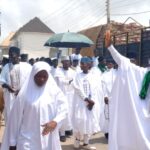Last week Tuesday, October 19, 2021 was observed as a public holiday in Nigeria to mark this year’s Eid ul-Maulid. The day is observed annually to commemorate the birth of the holy Prophet Muhammad, Salla-llahu Alayhi WaSalam (SAW). He was born on the 12th day of Rabiul-Awwal in 570AD, which in Islamic history is described as “The Year of Elephant”. Rabiul-Awwal the third month in the Islamic lunar calendar. In a statement to mark the occasion, the Minister of Interior, Rauf Aregbesola called on Nigerians to “imbibe the spirit of love, patience and perseverance which he said are the virtues of the Prophet Muhammad (SAW).
While Muslims who celebrate Eid ul-Maulid in Nigeria do so with every sense of dedication, the character of many of them contradicts the universal teachings of the same Propet (SAW) they eulogize his birth, life and teachings every year. Many of the virtuous qualities which made the Prophet Muhammad (SAW) a unique personality are missing in many of today’s Muslims. It lacks value addition when those who observe Eid ul-Maulid ignore, downplay, or contradict the Prophet (SAW)’s orthodox traditions. Such is not only ridiculous but further seeks to question their identity as practicing Muslims. We shall, in the next few paragraphs, attempt to showcase some virtuous qualities of the Prophet (SAW) and how the unbecoming attitude of today’s Muslims generally sets them far apart from anything called prophetic tradition.
- CBN jacks healthcare interventions to N200bn, to launch e-naira Monday
- How age cheats, accommodation crisis almost marred National Youth Games
The act of begging, for example, is completely strange to Islamic culture. Although he became an orphan after losing his father and mother at a tender age, the Prophet (SAW) never went in to begging. The Prophet (SAW) said in this wise: “Verily, it is better for you to take your rope and bring a bundle of woods upon your back and sell it, than to go and beg from others”. The prophet (SAW) also said: “whoso opens unto himself the door of begging, Allah will open unto him the door of poverty”. However, the widespread begging that has come to characterize the raditional Qur’anic school system especially in the northern states of Nigeria is, therefore, a neation of the teachings of the Prophet (SAW).
The noble Prophet Muhammad (SAW) rather worked hard to earn a living. Khadijah, a widow and wealthy merchant in Makkah, employed him to undertake business trips for her. Khadijah soon discovered Muhammad’s honesty, trustworthiness and transparency in all his dealings. Scarcely today would you find individuals who exhibit these qualities in their dealings and interactions with others. More often than not, people betray the trust entrusted in their care. The trust could be of speech, wealth, landed property, etc. eid ul-Maulid should be an ocassion for Muslims to reflect upon the character of the Prophet (SAW) with a view to emulating the manner in which he upheld every trust and confidence reposed in him without breaching the minutest aspect of it.
Qur’an 33:21 describes the Prophet Muhammad (SAW)’spersonality and states “Ye have indeed in the Messenger of Allah a beautiful (pattern of conduct) for anyone whose hope is in Allah and the Final Day…” He is an embodiment of all the virtues required by mankind to live a peaceful and prosperous life. Prophet Muhammad (SAW)’s character perfectly epitomizes honesty, contentment, modesty, kindness, compassion, humility, hospitality, tolerance, courtesy, good neighbourliness, and altruism. His exceptional trustworthiness gave him the name “Al-Ameen” meaning “The trustworthy”. A society so critically bedeviled with social ills like Nigeria had become in rcent tmes standsin need of guidance from the life and teachings of Prophet Muhammad (SAW). Corruption, deceit, greed, arrogance, wickedness, envy, malice, hate speech, betrayal, injustice, intolerance and bigotry have all strangely become typical of and dominant pattern in the social life of some Muslims. Indeed, such have rather but dissappointigly become norms among many.
Contentment is worth all the riches in this world. According to the Prophet (SAW), “Riches are not from abundance of worldly goods but from a contented mind”. Allah (SWT) loves those who are content. Khadijah was impressed by the excellent attributes she found in Muhammad (SAW). She thus decided to offer herself for marriage to the prophet Muhammad (SAW) and the latter mutually accepted it. Khadijah thus became the Prophet’s first wife. Khadijah who then was 40 years of age was 15 years older than Muhammad (SAW). The age factor in the marriage between the Prophet (SAW) and khadijah reveals the humility in both of them. The Prophet (SAW) once said that: “Humility and courtesy are acts of piety”.
Perseverance and endurance are two great qualities of Prophet Muhammad (SAW). After receiving the message of Islam through angel Jibril at the age of forty, he soon started facing hostilities from Makkan idolaters. Ditches were dug and thorns placed on his pathways. These molestations never made the Prophet (SAW) to give up the task divinely placed upon him. The Makkans laughed at him; calling him a liar. Undaunted by open mockery and persecutions, Prophet Muhammad (SAW) continued to preach and convert men from the worship of false gods to that of the one and true God, Allah.
Is it not absurd, therefore, to find Muslims today abandoning their religious duties in spite of the fact that they are not under any threats to practice their religion. What explanation has any believer who enjoys freedom of worship got to offer for being careless and irregular in his five daily prayers? The prophet (SAW) at the dawn of Islam had to leave Makkah, his birthplace, to Madinah in order to accomplish his task of delivering the message of Islam. How many people today would be ready to leave their place of birth on account of religion?
Leaving Makkah on hijrah, the Prophet (SAW) became a leader for both his men and his hosts, the Ansar (Helpers) in Madinah. His character earned him the leadership of the multi-religious city of Madinah, which then consisted of Christians and Jews. He established a community in which co-existence between Muslims, Jews and Christians was mutual and peaceful. He (SAW) evolved a constitution in which the rights and feelings of every member of the community were preserved and respected. The heterogeneous and multi-religious Nigerian society has many leaves to borrow from the Madinan constitution. With tolerance, patience and understanding, Muhammad (SAW) was able to unite people of diverse religious affiliations within Madinah into a strong force against external influences or attacks. May Allah guide us to emulate the teachings of the Prophet (SAW), amin.

 Join Daily Trust WhatsApp Community For Quick Access To News and Happenings Around You.
Join Daily Trust WhatsApp Community For Quick Access To News and Happenings Around You.


